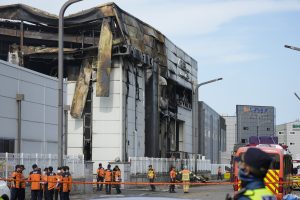On June 24, 23 workers died in a massive fire at a battery factory south of Seoul. The incident – one of the deadliest industrial disasters in South Korea’s modern history – highlights both the country’s atrocious workplace safety record and its disproportionate impact on the foreign laborers on which Korean manufacturers depend.
Most of the workers who died in the tragedy were Chinese. Their employment was illegal – the battery manufacturer Aricell failed to obtain the proper permits necessary to hire foreign workers and attempted to evade responsibility by setting up a paper subsidiary to hire them.
South Korea’s workplace safety record is among the worst in the OECD. Notably, over 10 percent of workers who died in industrial accidents last year were foreigners, far outpacing their proportion of the working population.
Foreign workers are heading into the most inhospitable areas of a dangerous economy, and are often dispatched temporarily to work sites where training is given hurriedly and largely in Korean. Housing, if provided, often exposes workers to the elements, which contributed to the death of a Cambodian farm worker in the winter of 2020. Poor working conditions for migrants in South Korea recently led to a backlash in the Philippines that is jeopardizing a pilot plan to recruit foreign nannies for the first time.
South Korean President Yoon Suk-yeol recently launched a drive to recruit migrants to fill gaps in the country’s economy, with a record 165,000 unskilled worker visas issued this year. The pool of young South Korean manual workers is slimming due to two major factors: The country’s low birthrate and young people’s understandable preference for high-paying, comfortable office work. Despite Yoon’s rhetoric and the increasing number of visas issued, South Korean migrant labor policy shows no meaningful shift in approach. The sectors that labor migrants can work in are limited, visas are tied to their employers, and virtually no help with their integration into society is offered.
Both South Korean policymakers and employers see foreign workers in the logic of mathematical formulas. Quotas are set for the year for each industry, and this share of temporary foreign workers is assumed to be all that is needed to shore up South Korean businesses against the decline in the working-age population. The lack of flexibility provided by the current policy, which binds workers to their employers, incentivizes migrants to work illegally so they can change workplaces at will to seek higher wages and better working conditions.
The proportion of migrants who were undocumented last year stood at 17.8 percent and has been growing in absolute numbers and percentage terms since 2012. Rather than recognizing that undocumented workers are sustaining crucial sectors of the economy and are often choosing to flee poor working conditions, the Yoon administration is wrapping up a two-month spring crackdown aimed at deporting such migrants.
In 2020, the previous Moon Jae-in administration toughened requirements for the F-2 visa, which grants permanent residency. This visa allows workers to work in any sector of the economy and frees them from the need for an employer to sponsor their residency.
However, the F-2 visa points system reflects an almost Trumpian understanding of the best immigrants as highly-educated and highly-paid. Immigrants receive more points if they make a high salary, have a high level of education, and are under 30. The permanent residency points system is geared to deny long-term lives in South Korea to the very workers that businesses demonstrate they need: low-wage workers with experience and language skills gained through years working in-country.
Ironically, the requirements for permanent residency are precisely the kinds of conditions that would foment an anti-immigrant backlash amid young South Korean voters, who are sensitive to intense competition for a limited number of well-paying, stable jobs. Despite this contradiction, the Yoon administration has done nothing to walk back his predecessor’s changes to the visa system.
South Korea’s economy is defined by an extreme gap in productivity and average income between successful conglomerates and struggling small enterprises. Conglomerates exploit their bargaining power to squeeze their smaller suppliers, who then seek to reduce costs by hiring cheaper foreign labor and cutting corners on safety standards. The battery manufacturer Aricell where the fire erupted was one of these small suppliers, with roughly 50 full-time employees.
Immigrants to South Korea, like most migrant workers in the world, are taking the dangerous, poorly-paid work that the native-born do not want to do. Too often, they end up sacrificing their lives in factory fires or freezing to death on farms. Unlike much of the developed world, many of those who have worked for years in South Korea have no clear path to a rewarding, free life in their adopted homeland.

































